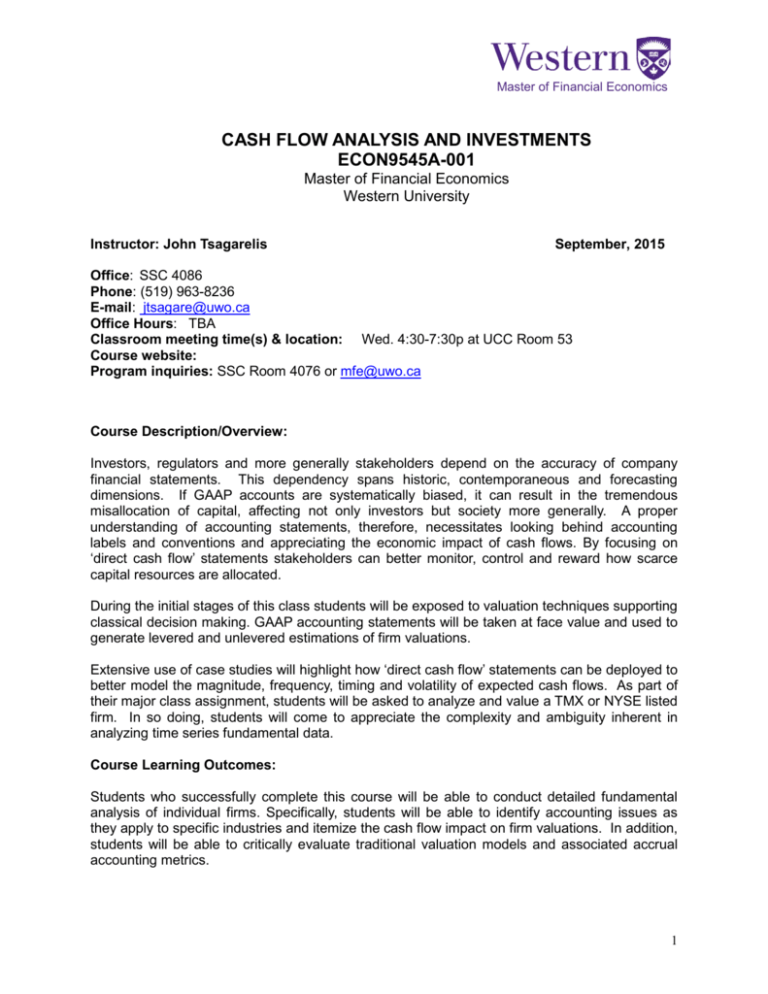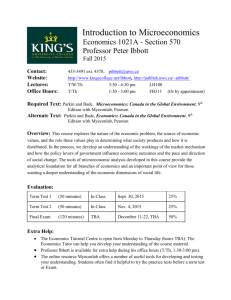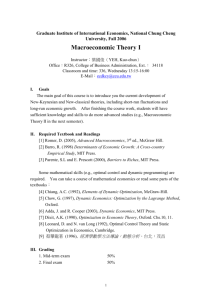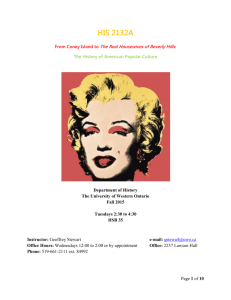CASH FLOW ANALYSIS AND INVESTMENTS ECON9545A-001
advertisement

Master of Financial Economics
CASH FLOW ANALYSIS AND INVESTMENTS
ECON9545A-001
Master of Financial Economics
Western University
Instructor: John Tsagarelis
September, 2015
Office: SSC 4086
Phone: (519) 963-8236
E-mail: jtsagare@uwo.ca
Office Hours: TBA
Classroom meeting time(s) & location: Wed. 4:30-7:30p at UCC Room 53
Course website:
Program inquiries: SSC Room 4076 or mfe@uwo.ca
Course Description/Overview:
Investors, regulators and more generally stakeholders depend on the accuracy of company
financial statements. This dependency spans historic, contemporaneous and forecasting
dimensions. If GAAP accounts are systematically biased, it can result in the tremendous
misallocation of capital, affecting not only investors but society more generally. A proper
understanding of accounting statements, therefore, necessitates looking behind accounting
labels and conventions and appreciating the economic impact of cash flows. By focusing on
‘direct cash flow’ statements stakeholders can better monitor, control and reward how scarce
capital resources are allocated.
During the initial stages of this class students will be exposed to valuation techniques supporting
classical decision making. GAAP accounting statements will be taken at face value and used to
generate levered and unlevered estimations of firm valuations.
Extensive use of case studies will highlight how ‘direct cash flow’ statements can be deployed to
better model the magnitude, frequency, timing and volatility of expected cash flows. As part of
their major class assignment, students will be asked to analyze and value a TMX or NYSE listed
firm. In so doing, students will come to appreciate the complexity and ambiguity inherent in
analyzing time series fundamental data.
Course Learning Outcomes:
Students who successfully complete this course will be able to conduct detailed fundamental
analysis of individual firms. Specifically, students will be able to identify accounting issues as
they apply to specific industries and itemize the cash flow impact on firm valuations. In addition,
students will be able to critically evaluate traditional valuation models and associated accrual
accounting metrics.
1
Master of Financial Economics
Evaluation:
The course grade will be based on students’ performance on two tests, one major assignment
and class participation as follows:
Midterm Exam
Project
Final Examination
Class Participation
20%
30%
40%
10%
100%
Required Textbook:
•
Charles, Mulford, Eugene Comiskey, Creative Cash Flow Reporting: Uncovering
Sustainable Financial Performance, John Wiley & Sons, 2005.
Recommended Readings:
•
Riccardo Rebonato, Plight of the Fortune Tellers: Why We Need to Manage Financial Risk
Differently, 2010.
•
Kenneth S. Hackel and Joshua Livnat, Cash Flow and Security Analysis, 2nd Ed. Irwin
Professional Publishing 1996.
In addition to the textbooks, several important articles will be assigned and used in class.
2
Master of Financial Economics
Topics and Reading List:
The following represents a tentative class and assignment schedule. It may be necessary to
amend/revise this schedule as the term progresses. If a student is absent from class, it is that
student’s responsibility to determine if any change to the schedule have been announced.
Week 1:
1. Introduction: On Intelligence, Jeff Hawkins Chapters 2, 4, 6, 7.
-The brain looks for patterns. It stores them, tests them and makes adjustments where
necessary. It’s not a computing machine. It’s an organic memory machine.
-Accounting is the language of business. It’s important to understand the economic
significance of accounting statements. A key learning objective is to understand
accounting statements to extract relevant identifiable cash flow patterns to parameterize
valuation ranges.
-What is the difference between investing and speculating?
-What’s the difference between skill and luck?
∆StockPx = ƒ(series of factors) {market beta, technical, fundamental, news/events,
themes, speculation, interest rates,…..central banks , etc., etc.)
Readings:
-John Maynard Keynes, The General Theory of Employment, Interest and Money,
Harcourt Brace Jovanovich, 1964, Chapter 12 (Handout)
-Seven Sins of Fund Management, A Behavioural Critique, Dresdner Kleinwork
Wasserstein, Global Equity Strategy, Nov. 2005.
-No matter what investors SAY they will do, the majority will always succumb to
emotional investment mistakes caused because they are human. Let’s be
mindful of the shortcomings up front.
-The Scandal of Prediction, Part I, Taleb
Week 2:
1. Valuation: a classical Approach:
-Merrill Lynch and the P/E multiple…stop dividing and multiply…
-The ‘nuts and bolts’ of a typical DCF model will be reviewed.
-What if WACC, growth rates and GAAP financial statements are overstated and unreliable?
Readings:
-The Level and Persistence of Growth Rates, L.Chan, J. Karceski, J. Lakonishok,
Journal of Finance, Vol. LLVIII., No. 2, Apr. 2003. [Please review in detail]
Week 3:
Charles Mulford, Creative Cash Flow Reporting. Chapters 1-5.
-Extensive review of accounting cases that distort accrual accounting presentations.
3
Master of Financial Economics
1. Hand out Four Seasons Hotels: Solution Set 2005.
2. Please obtain a copy of XYZ Corp financial statements for 2013 and 2014.
Week 4:
1. Charles Mulford, Creative Cash Flow Reporting: Chapters 6-10
-Extensive review of accounting cases that distort accrual accounting presentations.
Week 5:
1. Salt & Pepper: Risk & Return
Readings: Plight of the Fortune Tellers, R. Rebonato: Preface, Chapters 1, 3, 4, 7, 10.
Risk management extends beyond measuring risk or assessing probabilities. It’s about
making decisions in uncertain situations.
What ultimately limits risks? Regulations? Incentives? Simpler financial instruments? Lower
leverage?
Week 6: Mid Term Examination
Week 7:
1. Adjustments to Balance Sheet Accounts—please do not miss this class.
Readings: No assigned readings
-Class project can begin after this class.
Week 8:
1. Adjustments to Balance Sheet Accounts / Income Statement Accounts— please do not miss
this class.
Readings: No assigned readings.
Week 9:
1. Adjustments Income Statement Accounts/Comp. Income—please do not miss this class.
Readings: No assigned readings.
Week 10:
1. What if ‘Direct Cash Flow’ can better parameterize DCF inputs?
What if direct cash flows permit investors to better understand the magnitude, frequency,
timing and volatility of value adding (or subtracting) activities?
-Monte Carlo valuation simulations are introduced. Let’s re-visit the models we explored
during week 2.
Readings:
Are Cash Flows Better Stock Return Predictors than Profits?, S. Foerster, J. Tsagarelis, G.
Wang: http://papers.ssrn.com/sol3/papers.cfm?abstract_id=2472571
Week 11: TBD—possible guest lecturer.
Hand in Assignment beginning of this class on XXYY assignment
1.
Portfolio Management: Beta + alpha is best TBD
4
Master of Financial Economics
Week 12
1. Review Class–Please bring your Questions.
All students are reminded that plagiarism and/or other forms of cheating are serious
academic offences.
Policy on Academic Offences:
Scholastic offences are taken seriously and students are directed to read the appropriate policy,
specifically, the definition of what constitutes a Scholastic Offence, at the following web site:
http://www.uwo.ca/univsec/appeals_discipline/index.html
All required papers may be subject to submission for textual similarity review to the commercial
plagiarism‐detection software under license to the University for the detection of plagiarism. All
papers submitted for such checking will be included as source documents in thereference
database for the purpose of detecting plagiarism of papers subsequently submitted to the
system. Use of the service is subject to the licensing agreement, currently between the
University of Western Ontario and Turnitin.com (http://www.turnitin.com).
Statement on Mental Health:
If you or someone you know is experiencing distress, there are several resources here at
Western to assist you. Please visit http://www.uwo.ca/uwocom/mentalhealth/ for more
information on these resources and on mental health.
5










